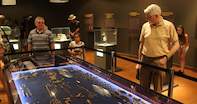
The latest findings support the theory that it was in Africa, and most likely South Africa, that humans evolved - where we first stood up on our own two feet and walked across the savanna.
Here that we started to distinguish between our different grunts and snorts, and form them into words, and learned to utilise our marvellous thumbs to take control of our world - and to harness the awesome power of fire that came cracking down from the summer sky.
There are other archaeological remains all over the country but not all are easy to see. One of the more accessible ones is Nelson's Bay Cave in the Robberg Nature Reserve in Plettenberg Bay. Visitors can see the in situ remains of the hunter-gatherers who lived there tens of thousands (perhaps hundreds of thousands?) of years ago.
A fascinating field museum consists of a tunnel, which shows, with explanatory text, the different layers of debris, which filled the cave over the millennia. Not only is it an interesting trip back in time, it's also a spectacularly beautiful walk.
Fossils of some of the oldest organisms on earth were found in the Barberton sequence, which is dated at approximately 3 billion years. In the period before some of the world's first dinosaurs walked the earth, there was already abundant life in the Karoo basin, leaving behind a record of the ancestry of mammals.
 If you’ve not visited the Cradle of Humankind World Heritage Site before, near Krugersdorp/Mogale, you’re in for a real treat. This rema...
If you’ve not visited the Cradle of Humankind World Heritage Site before, near Krugersdorp/Mogale, you’re in for a real treat. This rema... The first evidence of human beings in Namaqualand and the Richtersveld is represented by crude stone tools, such as choppers and hand axes f...
The first evidence of human beings in Namaqualand and the Richtersveld is represented by crude stone tools, such as choppers and hand axes f...